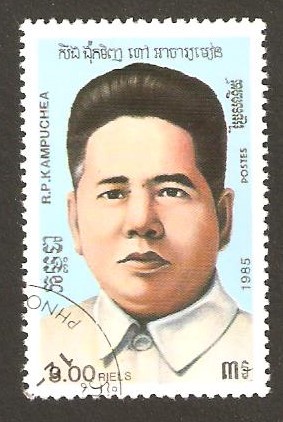History has an uncanny way of repeating itself, often in unexpected and disquieting ways. One of the more controversial chapters in the annals of American foreign policy is the indirect support the U.S. provided to the Khmer Rouge during the Cambodian Civil War.
This grim episode finds unsettling parallels in America’s contemporary backing of rebel groups in conflict zones like Syria. Both instances highlight a complex web of geopolitical strategies, unintended consequences, and moral ambiguities.
The Cold War Calculus: America and the Khmer Rouge
In the wake of the Vietnam War, Southeast Asia became a battleground for ideological supremacy between the United States and the Soviet Union. The rise of the Khmer Rouge, led by Pol Pot, marked a brutal chapter in Cambodian history, characterized by genocide and unimaginable suffering. Yet, the geopolitics of the time saw the United States indirectly supporting the Khmer Rouge, albeit reluctantly and largely through tacit means.

After the Khmer Rouge was ousted by Vietnamese forces in 1979, the U.S. found itself in a curious position. The enemy of their enemy — the Vietnamese — was now the Khmer Rouge. Despite the Khmer Rouge’s horrific human rights record, the U.S. provided indirect and direct support to this group through aid to anti-Vietnamese coalitions, which included the Khmer Rouge. The motive was clear: to counter Soviet and Vietnamese influence in the region. This strategy, while perhaps effective in the short term, left a lasting stain on America’s moral standing, but also caused huge suffering to the normal people of the Peoples Republic of Kampuchea, much of which is still felt today,
Modern Parallels: Syria and Beyond
Fast forward to the 21st century, and we see strikingly similar patterns in America’s approach to conflicts in the Middle East, particularly in Syria. The Syrian Civil War, ignited in 2011, saw the U.S. supporting various rebel factions against the Assad regime. The rationale was to promote democracy and counter the influence of hostile powers like Russia and Iran. However, this involvement has been fraught with unintended consequences and moral complexities.
Just as in Cambodia, the U.S. found itself allied with groups whose ideologies and methods were, at times, deeply problematic. Rebel factions, some with links to extremist organizations, received American arms and funding. The goal of ousting Assad often overshadowed the ethical implications of supporting these groups. This mirrors the indirect backing of the Khmer Rouge, where strategic interests took precedence over humanitarian concerns.
You can read about Rojava here.
Geopolitical Chess Games
Both historical and modern instances underscore the geopolitical chess games that great powers play. In Cambodia, the Cold War dynamics drove U.S. policy, leading to support for a regime that committed atrocities against its own people. Similarly, in Syria, the desire to counter Russian and Iranian influence has led the U.S. into alliances with questionable groups.
The overarching theme here is the prioritization of strategic interests over ethical considerations. This realpolitik approach often results in short-term gains but can cause long-term damage to a nation’s moral authority and global standing. The collateral damage in terms of human lives and suffering is often immense and difficult to justify.
Unintended Consequences
A recurring element in these scenarios is the unintended consequences that follow such foreign policy decisions. The support for the Khmer Rouge did not lead to a stable or democratic Cambodia but rather prolonged conflict and suffering. In Syria, American support for rebel groups has contributed to a protracted civil war, regional instability, and a massive humanitarian crisis.
These outcomes highlight the dangers of interventionist policies driven by strategic imperatives without a clear and consistent ethical framework. The fallout from these decisions can last decades, affecting regional stability and international relations long after the initial conflict has subsided.

From Cambodia to California: Survivors of the Khmer Rouge genocide need access to mental healthcare
The Moral Dilemma
The moral dilemma inherent in these situations is stark. How does a nation balance its strategic interests with its ethical responsibilities? The U.S. support for the Khmer Rouge, albeit indirect, is a historical blight that raises uncomfortable questions about the morality of foreign intervention. In modern conflicts like Syria, similar questions arise: is it justifiable to support groups with dubious credentials in the pursuit of broader geopolitical goals?
This dilemma is further complicated by the fluid and often opaque nature of alliances in such conflicts. Rebel groups can splinter, change allegiances, and adopt extremist ideologies, making it challenging to predict and control the outcomes of foreign support. This unpredictability adds another layer of risk and complexity to interventionist policies.
To read about the Party of Democratic Kampuchea click here.
Lessons for the Future
Reflecting on these parallels, several lessons emerge for future foreign policy. First and foremost is the need for a balanced approach that carefully weighs strategic interests against ethical considerations. While realpolitik may dictate certain alliances, it is crucial to maintain a moral compass to guide decision-making.
Secondly, there is a need for greater transparency and accountability in foreign policy decisions. The covert nature of support for groups like the Khmer Rouge or Syrian rebels often obscures the full extent of involvement and its implications. Transparent policies and open debate can help ensure that foreign interventions are more carefully scrutinized and ethically sound.
Conclusion American Support for the Khmer Rouge and Modern Rebel Groups
The echoes of America’s indirect support for the Khmer Rouge in its modern backing of rebel groups in Syria and other conflict zones serve as a poignant reminder of the complexities and moral ambiguities inherent in foreign policy. These historical and contemporary parallels highlight the need for a more nuanced and ethically grounded approach to international relations. As the global landscape continues to evolve, learning from these past missteps will be crucial in forging a path that balances strategic interests with the imperative of human rights and ethical responsibility.




